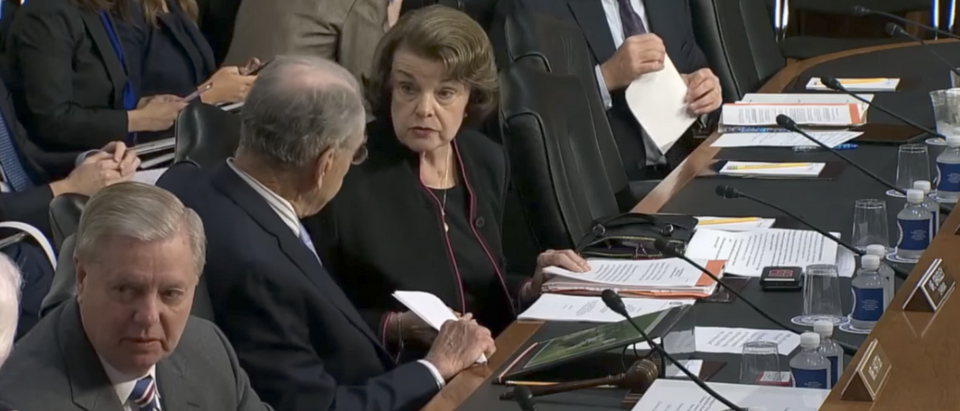The Senate Judiciary Committee scheduled confirmation hearings for a slate of President Donald Trump’s judicial nominees Thursday, among them two candidates for vacancies on appeals courts in states represented by Democratic lawmakers.
The news indicates that Democratic senators have allowed consideration of these nominations to proceed, as informal Senate protocol dictates that such hearings are not scheduled without the consent of relevant legislators.
The hearing, set for Sept. 6, will consider the nominations of Michigan Supreme Court Justice Joan Larsen to the 6th U.S. Circuit Court of Appeals and Notre Dame Law School Professor Amy Coney Barrett to the 7th U.S. Circuit Court of Appeals. Larsen’s name appeared on Trump’s list of potential Supreme Court nominees during the 2016 general election, and is often touted as a potential candidate should another high court vacancy arise in the coming years.
Larsen was nominated to a 6th Circuit seat in Michigan, which is represented by two Democratic senators. Barrett was nominated to a 7th Circuit seat in Indiana, which has one Democratic senator. By Senate convention, senators from states where judicial vacancies occur submit an opinion or a “blue slip,” giving a positive or negative evaluation of a nominee named to that vacancy. As a general matter, the Judiciary Committee will not convene a hearing for a nominee until the relevant senators submit their blue slips.
As such, the Democrats from these states have effective veto power over the Larsen and Barrett nominations. With confirmation hearings set, Larsen and Barrett have circumvented the only meaningful procedural mechanism by which Democrats could quash their nominations.
GOP Sen. Chuck Grassley of Iowa, who chairs the Committee, previously hinted that he would proceed with hearings for nominees to circuit courts, even in the absence of blue slips.
“I think the blue slip is more respected for district court judges historically than it has been for circuit,” Grassley said in May. “It’s much more a White House decision on circuit judges than the district court judges. I mean this is going to be an individual case-by-case decision, but it leads me to say that there’s going to have to be a less strict use or obligation to the blue slip policy for circuit, because that’s the way it’s been.”
Three other nominees will appear before the Judiciary Committee after Larsen and Barrett, including William Campbell, Jr. and Thomas Lee Robinson Parker, who were nominated to district courts in Tennessee, and Eric Dreiband, Trump’s nominee to lead the civil rights division at the Department of Justice (DOJ).
University of Richmond School of Law Professor Carl Tobias, an expert in federal judicial selection, told The Daily Caller News Foundation that it is uncommon for multiple judicial and political nominees to appear in a single confirmation hearing. He said such hearings strain resources and compromise the quality of vetting.
“[A]dding two district nominees and a DOJ Assistant AG nominee whose views may be controversial on top of two circuit nominees strains limited Judiciary Committee resources to prepare for the hearing and limits the time that each senator can question the nominees,” Tobias told TheDCNF. “It also seems very late to announce the four additions to what was initially announced as a hearing for Professor Barrett alone.”
Tobias said it was extremely rare for multiple circuit court nominees to appear before the Judiciary Committee during the Obama administration, let alone multiple circuit court, district court, and political appointees.
The NAACP Legal Defense and Educational Fund’s policy director, Todd Cox, echoed those concerns, arguing that the schedule would not provide the panel adequate time to assess Dreiband’s nomination. Cox says a rigorous deliberative process is essential in vetting a DOJ civil rights chief in the aftermath of white supremacist violence in Charlottesville, Va., which left one dead and more than a dozen injured.
“In this moment the Justice Department should be under a magnifying glass, and the American people deserve answers about whether and how this administration will enforce federal civil rights laws,” he said in a statement. “This unfair and deficient process provides yet another reason for the Senate to reject Dreiband’s nomination.”
Send tips to kevin@dailycallernewsfoundation.org.
All content created by the Daily Caller News Foundation, an independent and nonpartisan newswire service, is available without charge to any legitimate news publisher that can provide a large audience. All republished articles must include our logo, our reporter’s byline and their DCNF affiliation. For any questions about our guidelines or partnering with us, please contact licensing@dailycallernewsfoundation.org.


